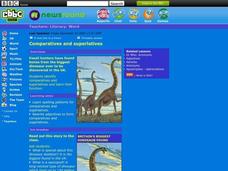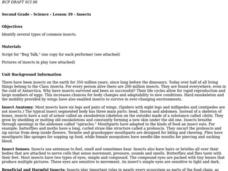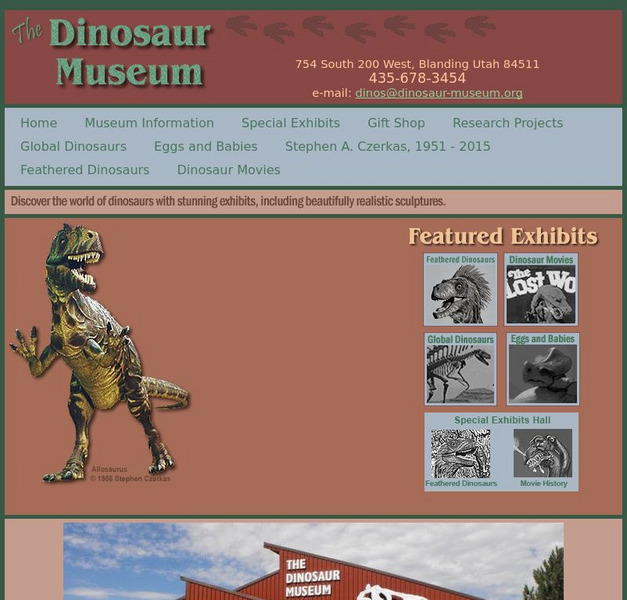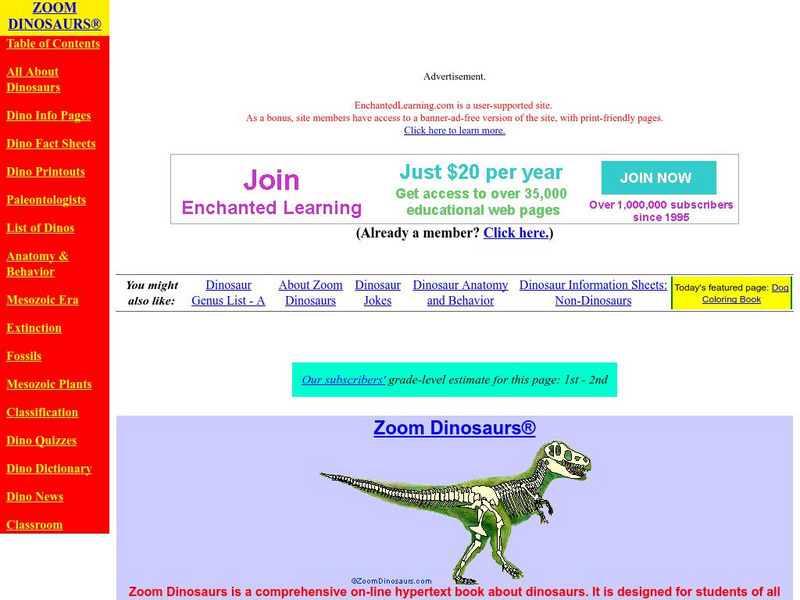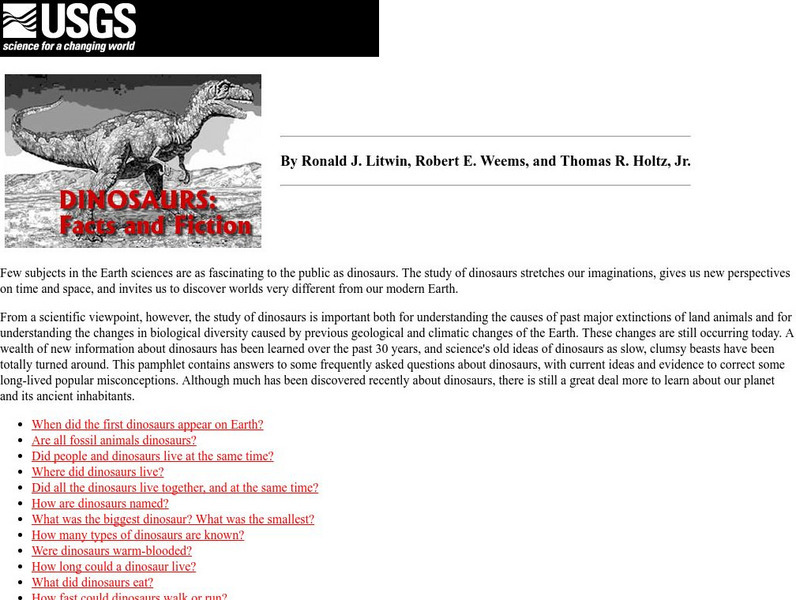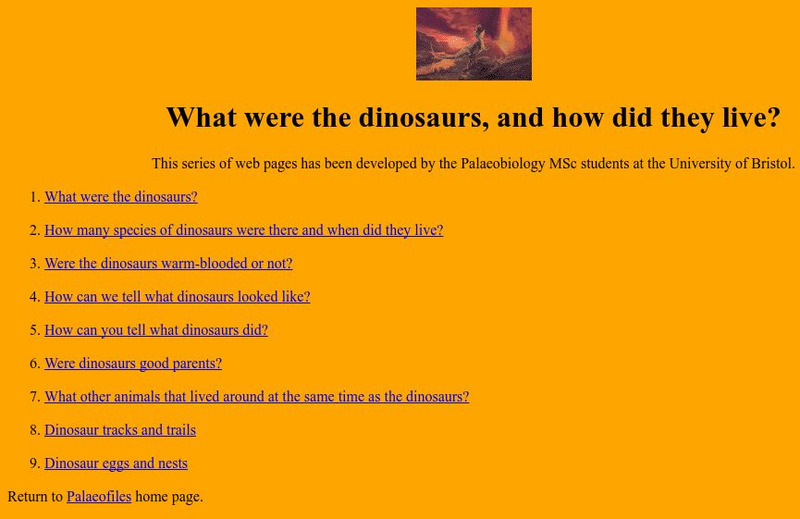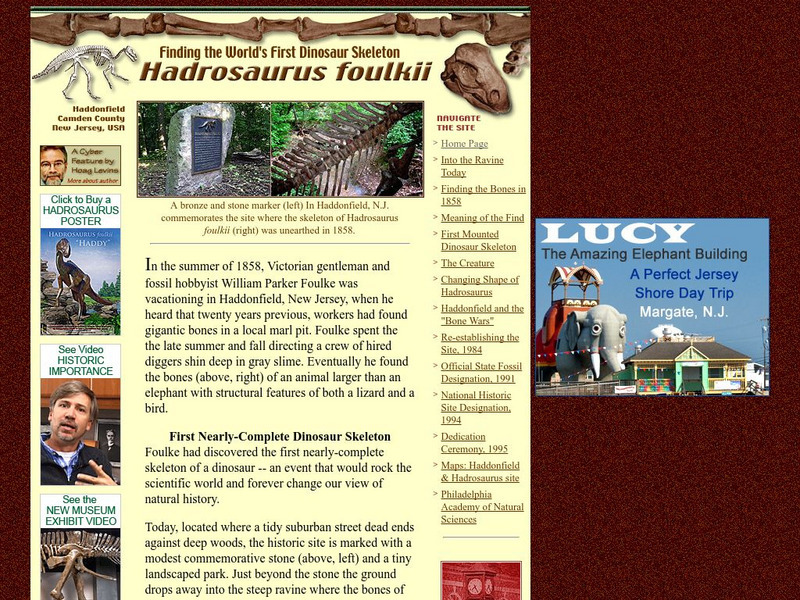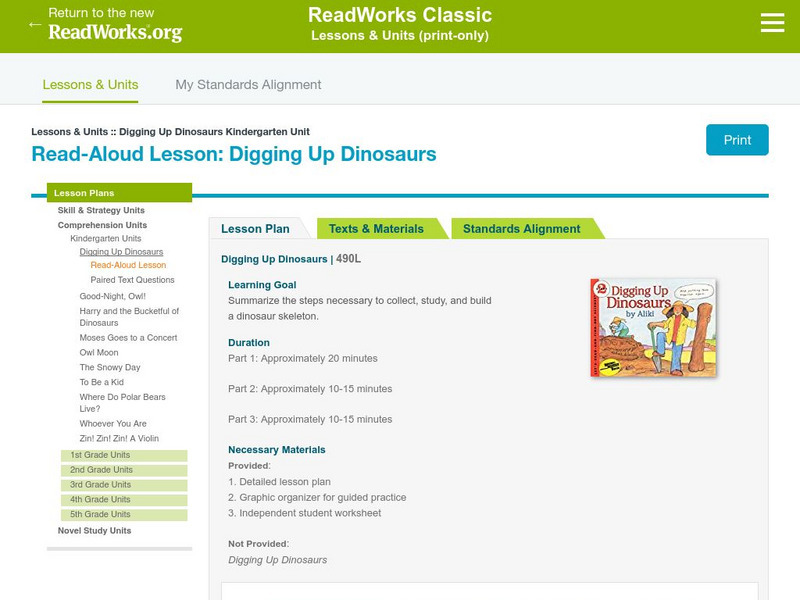Curated OER
Dino Fossils
Primary paleontologists discover the information they can gather from examining fossils. They place pictures in the correct sequence showing how an animal becomes a fossil. They discuss which sediments would preserve fossils better as well.
Curated OER
Bone Thickness
Students calculate the relative thickness of limb bones in five different species. They relate this to the strength and functions of the limbs by comparing and contrasting the values calculated from the bone measurements. They work in...
American Museum of Natural History
Paleontology Books
A list of 11 books about paleontology offers titles, authors, and a brief description of the tale.
American Museum of Natural History
Layer of Time
Dig through the layers for a better understanding of fossils. Scholars learn that fossils form in layers of sedimentary rock. Pupils arrange virtual layers to show the fossil record of different species. Once the layers are correct, they...
Curated OER
Women in Science: Dr. Grace Bush
Learn about the study of paleoecology with a resource about Dr. Grace Bush and her contributions to the field. After reading a one-page passage, learners answer comprehension questions and explore their personal interests in different...
Curated OER
Reptiles and Amphibians
Introduce your class to various reptiles and amphibians. They will meet and identify a representative from each of the four major reptile families, then learn about and discuss reptile characteristics. Next, they will identify and...
Curated OER
Desert Postcards
Students research characteristics of deserts. They present their findings in small groups to the class. Students utilize information learned about desert biomes, geography of the route of the Niger, and expeditions in their writing.
Curated OER
Sand & Water: Shape Search
Students act as amateur archaeologists as they participate in their own "dig" to explore and record unusual shapes. For this shape exploration lesson, students use trowels and shovels to dig, and learn to sift the dirt with screens to...
Curated OER
Comparatives and superlatives
Students identify comparatives and superlatives. Students read article on comparatives and superlatives. They explore spelling patterns. Students rewite adjectives to form comparatives and superlatives and complete a worksheet.
Curated OER
Mystery State #50
In this mystery state worksheet, students answer five clues to identify the state in question. They then locate that state on a map.
Curated OER
Prehistoric Mesosaurus
Middle schoolers draw conclusions why Mesosaurus has only been found in Africa and Brazil and how its fossil remains serve as important evidence that shows where two continents were once joined together.
Curated OER
Insects
Second graders brainstorm and identify several types of common insects. They play bug bingo, building bugs and an insect tree, observing real insects in the classroom and examining some of the things insects make.
Curated OER
All About Birds
In this birds worksheet, students answer 25 short answer questions about birds. They color and label the different parts of a bird and fill in the correct term given the definitions.
Curated OER
Relative Pronoun Gap Fill
In this ESL pronouns worksheet, students read and analyze a friendly letter that has missing words. Using the relative pronouns from a word bank, students fill in the spaces.
Curated OER
Corridor of Time Fieldtrip Worksheet and Explorers Heritage Center History Hunt
In this Corridor of Time and Explorers Heritage Center worksheet, students respond to 29 short answer and fill in the blank questions regarding information presented in the North Dakota Heritage Center.
Curated OER
The Envelope Please
Young scholars examine and research the importance and functions of the skeletal system in vertebrates. They construct a 10-foot geodesic dome to illustrate the importance of architectural frameworks and create a clay animation movie.
Curated OER
Galaxies and the Universe
If Earth was formed 4600 million years ago, and the sun revolves about the center of the Milky Way once every 250 million years, how many revolutions have occurred? Students answer this question and ten more, all providing students with...
Other
The Dinosaur Museum
The Dinosaur Museum is located in Blanding, Utah. Use this site to learn all about the exhibits and dinosaur information.
Enchanted Learning
Enchanted Learning: Zoom Dinosaurs
Zoom Dinosaurs is a comprehensive on-line hypertext book about dinosaurs. It is designed for students of all ages and levels of comprehension. It has an easy-to-use structure that allows readers to start at a basic level on each topic,...
US Geological Survey
Usgs: Dinosaurs: Fact and Fiction
A comprehensive series of pages that answers a number of commonly asked questions about dinosaurs.
Other
University of Bristol: What Were the Dinosaurs, and How Did They Live?
Answers to a series of nine questions related to dinosaurs. There are a number of links to other informative sites as well.
CPALMS
Cpalms: Structures and Skeletons
In this interactive learning module, students read informational text about dinosaurs and examine paragraph structure. They will learn about different types of text structure for informational paragraphs, identify the most effective...
Other
Hadrosaurus.com: Finding the World's First Dinosaur Skeleton:hadrosaurus Foulkii
Hadrosaurus foulkii was the very first dinosaur skeleton ever found. It was excavated in 1858 from a field in New Jersey. The story of the discovery, the excavation and the huge impact this had on the scientific world are described in...
Read Works
Read Works: Read Aloud Lesson: Digging Up Dinosaurs
[Free Registration/Login Required] Teachers will read "Digging Up Dinosaurs" using the close reading technique. Students will use graphic organizers to summarize the steps necessary to collect, study, and build a dinosaur skeleton.










